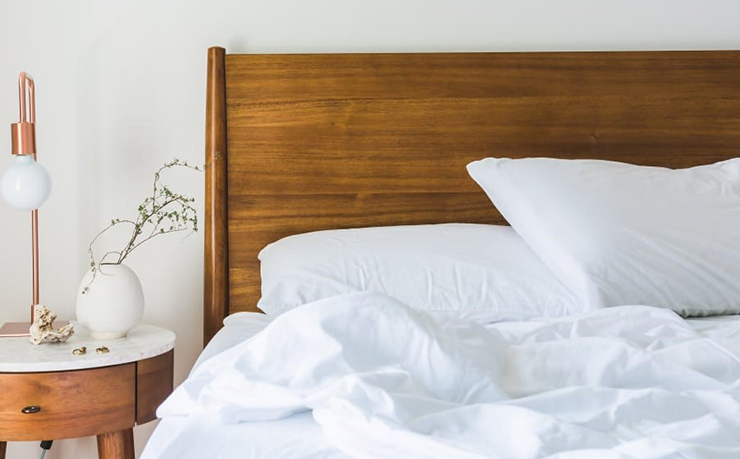It is normal to have an occasional sleepless night. But, if it has become a routine to spend nights tossing and turning, then you should consider re-evaluating your sleep habits.
SAMAR HAFEEZ, BENGALURU
AUGUST 18, 2020
And He it is Who has made the night a covering for you, and Who has made sleep for rest, and has made the day for rising up.[1]
Sleep is one of those things that should come naturally; for many, it does while for some individuals, however, a restless night is a routine. Our body needs ‘rest and relaxation’ period in order to revitalize. However, nowadays, COVID-19 has further damaged our muddled up sleep patterns.
An adequate amount of sleep is crucial to mental, emotional and physical health. Fast-paced life has created so much sleep deprivation that what is really abnormal sleepiness is now a norm. Unsatisfactory sleep is emerging as a serious health issue during COVID-19, which requires immediate recognition and intervention.
Sleep and health
Improper sleep leads to more than just feeling of being tired. It interferes with one’s cognitive functions causing impairment of attention, alertness, concentration, reasoning, and problem-solving and decision-making abilities. It also increases the risk of automobile and work-related accidents. In children, it can lead to learning disabilities and memory problems.
Recent research shows that sleep plays a role in ‘consolidating’ memories in the mind; thus insufficient sleep can cause difficulties in recalling previously learned information. Sleep is an integral part of emotional regulation, a lack of which leaves your emotions unstable and in disarray. Chronic sleep loss can also adversely affect life by contributing to the development of cardiovascular diseases, type 2 diabetes and obesity.
Understanding the sleep cycle
A closer look into sleep shows a good deal of activity occurring throughout the night. Understanding what happens during sleep also means understanding the sleep cycle, which consists of two recurring phases; REM (rapid eye movement) and NREM (non-rapid eye movement). For sleep to be termed as good quality sleep, these phases are imperative.
NREM sleep typically occupies 75-80 per cent of total sleep each night. Many of the health benefits such as tissue growth and repair, energy restoration, the release of essential hormones for growth and development occur during this stage of sleep.
REM typically occupies 20-25 per cent of total sleep each night. This stage is where you start dreaming. It is also thought to be vital for learning and developing new skills.
How much sleep do we need?
The amount of sleep each person needs depends on many factors including age. Infants generally need about 16 hours of sleep a day, while teenagers need about 9 hours and for most adults, the recommended amount of sleep is at least 7-8 hours of uninterrupted sleep.
It normally takes 10-30 minutes to fall asleep once you climb into the bed; this is known as sleep latency. If it takes more than this, then probably your body may be trying to tell you something. The first step here would be to try to improve your sleep hygiene.
What is sleep hygiene?
Sleep hygiene is a variety of different practices and behaviours that are necessary to have a good quality nighttime sleep and full daytime alertness.
Keeping your sleep time “clean” from waking time activities will improve sleep quality and your overall quality of life as well.
Use the following practices to get a good night’s sleep
Get regular exercise: Exercise is known to promote sleep quality. Getting regular exercise for 15-20 minutes at least 3 times a week is an excellent way to start.
Maintain regularity: Stick to a bedtime schedule. Sleep at the same time every night and wake up at the same time daily, even on weekends. This will help your circadian rhythm to function properly.
Avoid stimulants: Stay away from stimulants like coffee, aerated drinks, chocolate and nicotine post-sunset. These stimulants hamper one’s quality of sleep by decreasing the time spent in deep sleep; leading to fragmented sleep and nocturnal restlessness. Try to avoid engaging in tasks that require attention and concentration including studying or any stimulating conversations.
Keep it cool: Always sleep in a slightly cool room. This helps the temperature in the brain to drop and help fall asleep quicker. And most importantly do not ever go to bed angry; this will not only feed the mind with racing thoughts but will negatively affect relationships and cause persistent sleep disturbances.
Melatonin- the sleep hormone: We need darkness in the evening to allow the release of a hormone called Melatonin; “the chemical of sleep”. This hormone prepares you for sleep and is inhibited by bright light. In this modern era we are severely deprived of darkness, so try to dim lights down in your home an hour before bed.
Avoid electronics before bed: This is an extremely crucial practice. Stay away from electronics, especially blue light emitting gadgets. Blue light affects the melatonin level than any other wavelength. Also, try avoiding COVID bulletins and other stuff that may trigger your anxiety around bedtime.
Keep your bedroom for sleep only: The room should be a relaxing space. Avoid working, studying or eating on the bed.
Do not stay in bed awake: If you have not fallen asleep within 30 minutes of getting into bed, or have woken up and are finding it difficult to fall asleep, the advice is to get up, go to another room, and in dim light, meditate by simply taking in deep belly breaths.
Do not use electronics; no email or message checking. And definitely no food. You should return to bed only when you feel sleepy again. That way your brain can understand that the bed is a place to sleep and not a place to stay awake.
Sleep aiding accessories: Get earplugs, eye masks and sound conditioners; use whatever you need to create a serene environment. There are many sleep trackers in the market to measure your quality of sleep. You can use wearable or in-bed sleep tracking systems to know your sleep quality. Tracking your sleep can give you vital insights into your overall health and well-being. And do not nap after 3 p.m.
Avoid large meals 2-3 hours before bed: Try to eat dinner by 7:30 or 8:00 p.m. every day. A minimum of 2-hour gap between dinner and sleep is essential to secure good quality sleep.
Stress: If you find you are stressing over all the things you have to do, then write them down in a sleep journal. Your prefrontal cortex is assigned to keep all these things active in your working memory. This stress inhibits sleep. Writing the racing thoughts down can help alleviate stress to a great extent.
Try magnesium-rich foods: Magnesium is a natural muscle relaxant, which aids in reducing anxiety. Foods like warm milk, fish or fish oil, almonds, bananas, mushrooms, dark green leafy vegetables, pumpkin seeds, cherries or a glass of cherry juice before bed, or in dinner can help.
Try herbs: Have a cup of chamomile tea 30 minutes before bed. Chamomile is regarded as a mild tranquilizer and sleep inducer as it aids in relaxing muscles and nerves helping you to fall asleep quicker.
Some signs of poor sleep hygiene
Frequent sleep disturbances and day time sleepiness are the most telling signs of poor sleep hygiene. In addition, if you are taking too long to fall asleep, you should consider re-evaluating your sleep habits.
It is normal to have an occasional sleepless night, but if you find that it is becoming a routine, then you should consider seeing a sleep therapist or a psychiatrist in order to sort out deeper reasons behind sleeplessness.
You may be having conflicts that you are unaware of, which might be preventing you from sleeping peacefully. Better sleep leads to better mental health and a better life. A therapist can help you develop a plan to address its causes and thereby help you accomplish a good quality sleep every night.
The author is a clinical psychologist and a certified holistic health coach and is a regular contributor for Light of Islam.
References:
[1] Holy Quran 25: 48













0 Comments